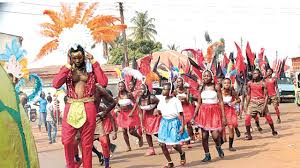The Idoma people are the second largest ethnic group in Benue State. Significantly, there are other Idoma groups in parts of Nassarawa and Cross-River states. The Idoma people are a homogenous ethnic group with dialectical differences indicated by some distinct speech form of people in Otukpo, Adoka and Ugboju; Edumoga in contrast to Agila, Otukpa, Orokam, Agatu among others. They are also known to be very hospitable!
History of Idoma People
According to traditional history, Iduh, the father of the Idoma had several children who each established different areas. Hence the expression: “Iduh the father of Idoma.” “Iduh the father of Idoma Iduh who begot all the Idoma He also begot the following children: Ananawoogeno who begot the children of Igwumale; Olinaogwu who begot the people of Ugboju; Idum who begot the people of Adoka; Agabi who begot the people of Otukpo; Eje who begot the people of Oglewu; Ebeibi who begot the people of Umogidi in Adoka, Edeh who begot the people of Edumoga and Ode who begot the people of Yala. ” While there may be some truth to the above, the Idoma cannot be said to have a unitary origin. Many Idoma groups and village subsets have their own histories complete with stories about how their people arrived at their current location. The Otukpa people descended from three ancestors: Owuno, Ameh-Ochagbaha and Oodo. The first two were brothers who migrated from Idah in Igalaland while Oodo migrated from Igbo land. As one can imagine, the ever-changing of people through time makes it difficult to study Idoma history.
Read more on Discover Nigeria
Idoma Traditional Attires and Colours
The traditional colours of the Idomas are red and black stripes. This has only been around since the 1980s to foster a distinct Idoma identity.
Even with the difference in dialectical speech, Idoma people maintain one particular traditional attire popularly called the “Apa”, which indicates the language’s unity.
The “black” colour on the attire signifies the “earth and burial shroud,” while the “red” colour signifies “royalty or red feather.”
The red feather is often fixed on the head of the traditional leader. The Idoma attire is well respected and it is a significant symbol in local meetings. It is important for every member of these local meetings must wear either a muffler, cap (for the men), or headgear (for the women), failure to appear in the regalia attracts fines or sometimes a stipulated penalty.
Sign up to the Connect Nigeria daily newsletter
Socioeconomic/Political Structure
Predominantly, Idoma people are farmers who grow crops like yam, cassava, corn, rice, soya beans and palm fruits.
Och’Idoma is the leader of the Idoma people in Benue State, his resident is the Och’Idoma Palace in Otukpo.
The current traditional ruler is HRH, Elias Ikoyi Obekpa, Och’Idoma IV.
Marriage
While the marriage rites and customs of the Idoma people is not unlike that of the Igbo and some other south-eastern cultures, there are specific aspects that clearly distinguish their tradition. In some Idoma subcultures, the groom and his family have to present the bride with a rooster and some money on the marriage day after the bride price has already been paid. If she accepts, it is a sign of approval and disinterest if she rejects the gift. While there are no certain reasons to justify the need for a rooster, it remains an interesting part of the ceremony.
Traditional Food (Okoho Soup)
The Idoma are known for their love of food, as there is an annual food festival in Benue State to celebrate women and the various traditional cuisines. Most popular among their delicacies is the Okoho soup which is made with the peculiar Okoho plant, bush meat and many other ingredients
Religious Beliefs
With the advent of Christianity and other foreign religious, a large part of the Idoma people still believes strongly in the Alekwu, which is seen as the ancestral spirits – a link between the living and the dead. They host an annual ‘Aje Alekwu’ festival where traditional religious practitioners commune and make sacrifices in the worship of their ancestors across the land.
The Idoma have a strong attachment to the Alekwu-spirit of the ancestors which is believed to stand as an invisible watchdog of the family and communities while checkmating vices like adultery, theft and murder.
References
IamBenue
Wikipedia
Featured image source: The Guardian Nigeria
Got a suggestion? Contact us: [email protected]

